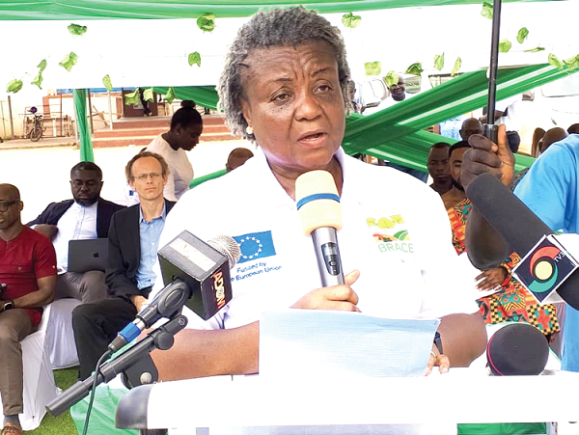
Environmental protection project rolled out for 200 mining communities
Three non-governmental organisations have launched a €1.7 million environmental protection project that seeks to strengthen access to justice for 200 mining communities in five regions.
The project is expected to also promote good governance and accountability in mining landscapes in the beneficiary areas, and ultimately enhance the environment of the five mining regions.
Dubbed: "Building Resilient and Active Communities in Extractive Landscapes (BRACE)", it is a three-year initiative aimed at ensuring adherence to human rights, transparency and accountability in mineral governance.
The project will be implemented in the Ahafo, Eastern, Ashanti, Western North and Western regions to improve sustainable mining, safeguard the environment and protect individuals living in the mining communities.
It is being implemented by A Rocha Ghana, in partnership with Nature and Development Foundation (NDF), and Wacam and funded by the European Union (EU).
Access to justice
The project also seeks to contribute to sustainable and equitable environmental management and good natural resource governance in the country by involving communities, the government and private extractive sector actors.
Under the project, the partners are expected to establish a network of paralegals from the beneficiary mining communities. They will help identify issues and work with community members through facilitated legal support, to resolve or safeguard issues and create a Legal Access Fund to support community courtroom advocacy.
Speaking at Kenyasi No.2 in the Ahafo Region last Tuesday, the Associate Executive Director of WACAM, Hannah Owusu-Koranteng, said the collaboration will help to develop a collective strength to address the devastating effects of irresponsible mining practices in mining communities
She said it would also address the continuous suffering of affected communities which manifested as polluted environment, water bodies and air, and the accompanying health issues as well as the destruction of farmlands and the loss of livelihoods.
“These devastating actions that have been perpetuated by the large-scale multinational mining companies, the small-scale miners, as well as illegal miners (galamseyers) have had a profound impact on the environment and the well-being of our communities,” she said.
Mrs Owusu-Koranteng said the project would protect the rights of mining communities and ensure that mining was done in a way that prioritised community well-being and the environment.
She said activities of the project would equip mining communities and embolden them to say no to irresponsible mining and enable them to hold the government and the extractive companies accountable for sustainable and responsible practices.
“Our goal is to create a platform for inclusive decision-making, where the voices of marginalised communities are amplified and their rights respected,” she said.
Economy
The Head of Cooperation, EU Delegation to Ghana, Massimo Mina, said the country's extractive sector was vital to its economy since it contributed significantly to export revenues.
He said irresponsible mining practices by both licensed and unlicensed mining operators in the last two decades had resulted in serious negative environmental and social impacts.
Mr Mina said communities residing near large-scale mining sites had to endure the loss of lands, contamination of water sources by toxic substances and health diseases.
“There have also been disturbing cases where journalists, reporters and active citizens faced threats and attacks when exposing violations of social and environmental rights resulting from illegal mining,” he said.
Legal framework
Mr Mina said those issues underscored the urgent need for the country to refocus on the legal framework towards sustainability, enforce the implementation of existing laws, and ensure full compliance with internationally acknowledged principles of responsible business, good governance and human rights.
He said mining could not take precedence over the human rights of communities and people, adding that “mining needs to truly benefit the people of the country”.
Mr Mina said the project was a significant step towards fostering resilience and creating active, empowered communities within the extractive landscape in Ghana.
The National Director of A Rocha Ghana, Dr Seth Appiah-Kubi, said gold accounted for more than 90 per cent of the total value of all minerals mined in the country.
However, he said its mining impacted negatively on the rights of mining communities to property, livelihood, housing, security, liberty, health and water.
Writer's email: biiya.ali@graphic.com.gh
